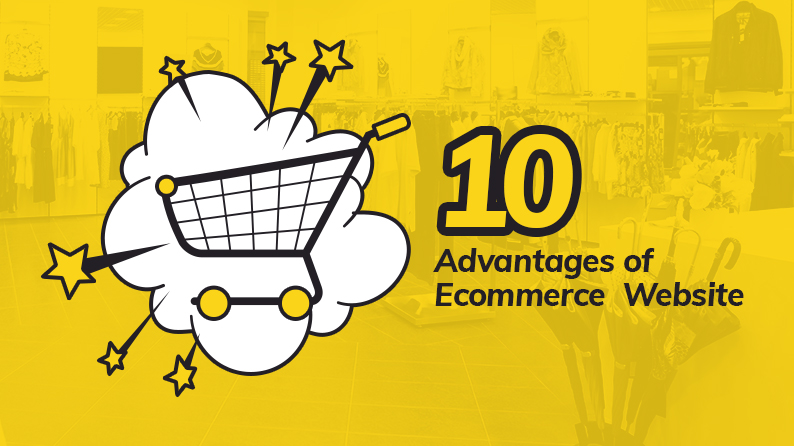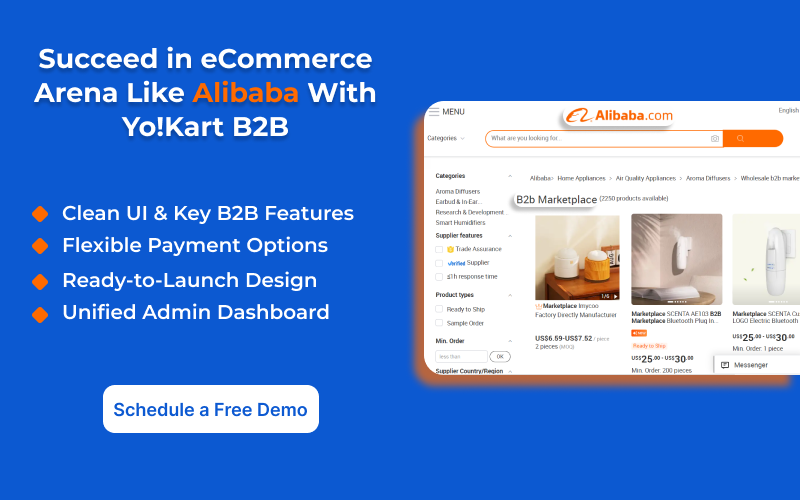Updated On: 13th September 2023
What is Alibaba.com?
Jack Ma (a former school teacher) and his 18 tech pioneers had a dream of building a B2B Online marketplace that connected Chinese manufacturers, retailers, distributors to buyers worldwide. They created Alibaba – a globally connected and competitive ecosystem where more manufacturers attracted more buyers, and vice versa. Soon, Alibaba became a household name in China, generating significant traffic on the website both from within China as well as around the world.
Launched in 1999 by Jack Ma, Alibaba is the world’s largest B2B Online marketplace headquartered in Hangzhou, Zhejiang China. It connects over 150K suppliers with 10 million+ buyers in 190+ countries, as shared on alibaba.com.
These days, many companiesÔÇÖ models are not ÔÇ£B2BÔÇØ ÔÇô they are ÔÇ£B-whatever-the-analysts-want-you-2-B.ÔÇØ If you stay focused on members then you will succeed in the long run.
– Jack Ma
Table of Contents:
- Introduction
- Business and Revenue Model of Alibaba
- How to Build a B2B E-commerce Marketplace like Alibaba?
- How to Choose the Right B2B E-commerce Platform?
- Conclusion
- Frequently Asked Questions (FAQs)
Trends and Forecast in B2B eCommerce marketplaces
Digitalization, Shift in consumer shopping preferences, and new growth avenues – there are several factors contributing to the rapid growth in the B2B eCommerce market. According to a report by Grand View Research, the global B2B eCommerce market was valued at $7.72 trillion in 2021 and is expected to reach $25.65 trillion by 2028 growing at a CAGR of 18.7%.
We are witnessing new trends with long-term implications transforming the B2B eCommerce industry. Some of the most popular trends are listed below:
- Professional buyers with B2C tendencies: The penetration of B2C eCommerce globally has transformed B2B buyers to display tendencies like B2C consumers. They expect a more streamlined buying experience such as quick delivery, omnichannel fulfillment, and more – at par with the buying experiences on leading eCommerce stores like Amazon or eBay.
- Personalized pricing options: From credit cards, preferred mobile wallets to Cash on Delivery (COD), there are several pricing options driving eCommerce growth in B2B. Personalized and local payment methods enable sellers to close more deals and provide buyers the convenience of purchasing online.
- Shorter Click-to-Consumer cycle time: Logistics has quickly emerged as a dominant factor driving consumer spending in omnichannel retail, according to a recent report by McKinsey. Hence, businesses should focus on eliminating any friction in logistics to ensure swift order fulfillment.
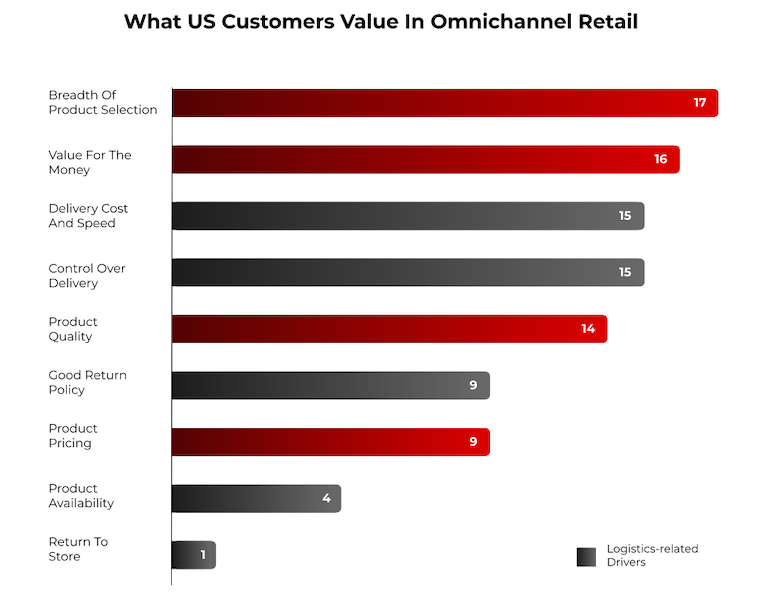
Source: McKinsey Digital Survey
Despite a slightly delayed adoption to eCommerce as compared to B2C businesses, the B2B brands are now increasingly vying for digital channels to boost sales. And, Alibaba.com – the leading B2B eCommerce marketplace with millions of active users, higher Gross Merchandising Volume (GMV), and rapidly increasing aggregate revenue is a perfect platform to scale.
Other B2B Multi-vendor Marketplaces
Apart from Alibaba, there are many other popular B2B marketplaces leading the digital landscape. Below we have listed the top 4 B2B marketplaces other than Alibaba:
- Amazon Business – A B2B ecommerce platform by Amazon.com launched in 2015. Amazon Business is a thriving marketplace available in 9 countries. It is estimated to reach $75 billion by 2023.
- eWorldTrade – Over 500,000 registered users, more than 100 categories, and a global presence makes eWorldTrade one of the popular marketplaces for B2B eCommerce.
- IndiaMart – With over 60% of the market share in IndiaÔÇÖs B2B eCommerce space and 25 years of existence, IndiaMart is one of the most reliable B2B marketplaces connecting buyers with suppliers.
- Global Sources – One of the oldest/earliest B2B platforms based in Hong Kong, Global Sources registers over a million monthly active users. It conducts online trade events to enable vendors to fulfill their business potential.
And more.
Business and Revenue Model of Alibaba
In 1979, the Chinese government implemented free-market reforms (an open market) opening up foreign trade and investment opportunities in the country. This potentially untapped large pool of workers to foreign businesses, thus making China a popular offshore destination for manufacturing firms. But, rigid Chinese investment policies meant that companies looking to make use of such opportunities should form a joint venture with Chinese partners. While the policies were intended to help Chinese retailers and entrepreneurs, developing such long-lasting relationships was difficult because
- Small-medium businesses and entrepreneurs in China had little recognition to be considered as partners
- Only those foreign companies with enough funds could sustain such ventures
With Alibaba, Jack Ma and his team created a smart, reliable, & interconnected B2B ecosystem for Chinese businesses to interact and perform business operations with foreign traders. In return, Alibaba earns its revenue from offering annual subscriptions for sellers.
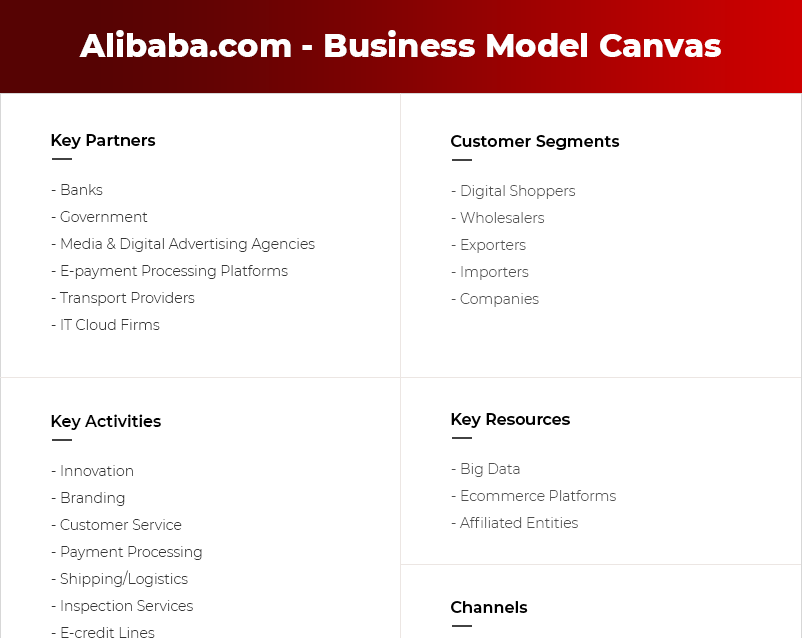
How does Alibaba work?
Essentially, Alibaba is a one-stop destination for global enterprises connecting B2B suppliers with buyers worldwide looking for wholesale products. For instance, a business can identify and connect with a manufacturer on Alibaba to produce and ship goods to the destination with ease. Since it is a B2B online marketplace, the most popular items are those that can be produced in bulk and sold wholesale to companies looking to replenish inventory. From apparel to electronics, Alibaba brings hundreds of millions of products in 40 major categories from wholesalers, manufacturers, and suppliers worldwide.
Choose suppliers from various regions to source customized products or trade services. Alibaba has over 174,000 active suppliers in 6,082 industries to help businesses discover new opportunities. The global sourcing marketplace has Chinese suppliers offering products at extremely low prices catering to businesses worldwide.
General Flow of Alibaba
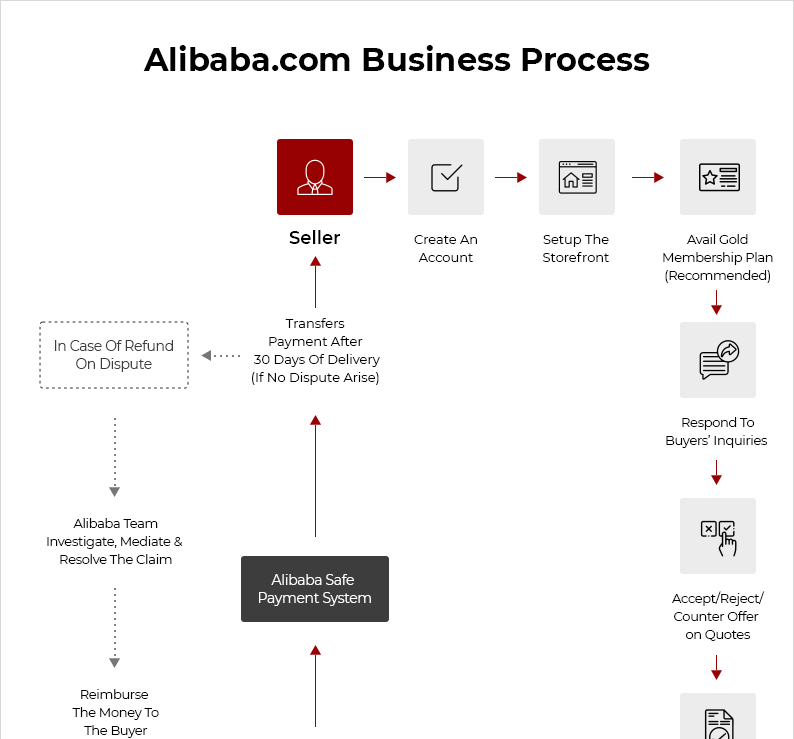
How does Alibaba make money?
Alibaba acts as an intermediate between sellers and buyers charging commission to vendors on each transaction. While commission per transaction is an important revenue channel for Alibaba.com. This isnÔÇÖt the only revenue channel through which they earn. The marketplace earns revenue from Gold membership plans.
Alibaba offers two supplier membership plans – Free and Gold. Under the free membership plan, sellers are not verified and can only list up to 50 products. On the other hand, Gold Supplier is a premium membership for suppliers to easily promote their products and maximize ROI. All Gold suppliers must pass a rigorous verification process by third-party agencies to earn a verified badge that generates trust. Moreover, all Gold members pay a commission fee per transaction.
Alibaba offers multiple seller plans for businesses to become Gold members and reach millions of B2B buyers globally. There are separate pricing plans for every country. For instance, there are 2 plans – Plus ($3,499 /year) and Pro ($10,799 /year) for sellers in the US. Similarly, for UK sellers – there are 3 pricing plans namely; Basic Plus ($2,999 /year), Standard ($3,999 /year), and Premium ($5,999 /year). While the plans and pricing may differ, all plans include several platform features (such as unlimited products, access to trending keywords, reporting tools, etc), customer service, and support for onboarding.
How to Build or Create an Online B2B Marketplace like Alibaba?
There are many reliable ways to create a website like Alibaba. Depending upon your requirements, you can choose one that suits you best.
- Code Yourself: Developing an eCommerce marketplace demands critical designing and development skills such as creating a seamless front-end design, use of accurate theme colors, implementing all essential eCommerce features, integrating third-party APIs, and more. Website development requires a lot of coding skills and consumes a lot of time/effort, which may delay your website launch.
- Hiring developers: Another way is to hire skilled developers to build a completely personalized eCommerce marketplace from scratch. You can either hire an in-house team for all development needs or outsource your development needs to custom eCommerce development firms like FATbit Technologies. Either way, building an eCommerce marketplace from scratch will consume hundreds of thousands of development hours.
- Readymade B2B eCommerce platforms: While development from scratch seems a good choice, more often than not, this isnÔÇÖt a viable solution. Since each business decision has wide-ranging implications, it is critical to invest your resources and effort smartly. Choose a turnkey eCommerce platform with all essential features that empower your business to centralize operations, accelerate transformation, and reduce time-to-market. Yo!Kart B2B, Shopify Plus, BigCommerce B2B – these are some of the most popular B2B eCommerce solutions.
Yo!Kart B2B – A perfect Readymade Solution to start your B2B Marketplace
How to Choose the Right B2B E-commerce Platform?
While a readymade B2B eCommerce platform significantly reduces launch time yet, you must identify and choose the right platform that clearly aligns with your business strategies. There are many key parameters that can be considered during the selection process. Below we have listed a few essential considerations for business owners:
1. Scalability: Amid consistently changing consumer behavior, evolving technological parameters, and accelerated digitization; it is important to choose an eCommerce platform that ensures scalability and long-term growth. Scalability in B2B means staying future-ready with access to the right resources, to automate processes and swiftly accommodate growing demands.
2. Personalization: A customizable platform helps deliver tailored experiences to your customers, propelling growth. For instance, the ability to personalize and offer customer-specific pricing or restrict access to hide bulk pricing for guest customers improves the user experience. A customizable platform ensures personalization, improves branding, and greatly increases user engagement leading to more conversions and repeat customers.
3. Ease of Use: Processes in B2B commerce are often complex involving bulk transactions, partial payments, recurring business orders, and more. This is why most B2B platforms offer several advanced features (such as Request for Quote (RFQ), Bulk discounts, etc) to streamline negotiations and facilitate B2B transactions. While these features do add value, they shouldnÔÇÖt come at the cost of convenience.
4. Flexible Payment Options: Unlike traditional B2C commerce, the transactions in B2B trades are much higher. These transactions often involve bulk purchases on a recurring basis instead of once-off smaller purchases. Hence, the ability to pay partially and via preferred payment method (including COD) is a must-have feature for a B2B eCommerce platform.
5. Trusted and Reliable: A trusted and well-recognized eCommerce platform is one that is widely popular among entrepreneurs, SMBs, as well as large-scale enterprises. Often the quality of projects delivered, worldwide clientele, and ratings on popular review sites can be a good indicator to help you decide. Look for reviews on sites like G2/Capterra, browse through their existing/past projects, and check for complete details on the platform before making an investment.
6. Essential B2B eCommerce features: Minimum order quantity, bulk pricing/discount feature, Request for Quote module, and multiple payment options are some of the essential eCommerce features for a B2B marketplace. Before you decide on your B2B marketplace solution, make a checklist of all essential eCommerce features on your selected platforms and compare. This will give you a better idea.
For more information on how to choose an ideal marketplace platform, check out our guide.
Suggested Read: Top 5 B2B eCommerce Platforms in 2023
Must-Have Features To Create a Successful B2B eCommerce Website like Alibaba
Since we are talking about Alibaba here, it is important to discuss and evaluate the top eCommerce features for a B2B eCommerce marketplace. Below we have listed some of the must-have features to create a website like Alibaba.
- Simple Sign-up and Profile Creation: Just like any other platform, user experience holds considerable value for a successful venture. A seamless registration process that is simple and intuitive allows users to quickly register on the marketplace. Moreover, setting up users’ profiles should be a streamlined process with easy-to-configure steps.
- Interactive User Interface (UI): Human interactions should always be easy, efficient, and visually appealing to minimize user effort enabling them to accomplish their goals with ease. The eCommerce platform should offer a smooth and engaging UI allowing users to interact and buy/sell products with ease.
- Sellers Management: Sellers need an individual dashboard to easily customize their storefront, view in-depth reporting/analytic tools, add/edit product inventory, keep track of stock, and more. It is an important feature for sellers to facilitate day-to-day business operations.
- Minimum Order Quantity (MOQ): Often a B2B seller is looking to sell wholesale and in bulk. So, the MOQ feature allows these sellers to set up a minimum purchase quantity for an order to be considered or allowed to take place.
- Bulk Ordering: B2B buyers are businesses looking for quality products at wholesale prices for their own venture. Bulk ordering means good products at a reduced source cost with potentially higher profit margins for your business. This is an important feature in a B2B marketplace.
- RFQ Module – Understanding what prices the suppliers are offering and whether it is within the buyerÔÇÖs budget is a crucial step in B2B transactions. The Request For Quote feature allows B2B buyers to send a quotation request to potential suppliers to ascertain the cost.
- Counter Offer & Negotiation: B2B buyers can interact directly with sellers for quality assessment, request a quotation, and price negotiation. Users (buyers and sellers) can accept, reject, or place a counter offer.
- Subscription Module: Create subscription packages for B2B sellers (such as manufacturers, retailers, and others) to register and list products in the marketplace. The admin can create multiple subscriptions.
- Multiple Payment Gateways: An option for B2B buyers to make payments (partial or final) with the preferred payment option. A B2B marketplace should come pre-integrated with multiple payment gateways.
- Reporting and Analytics: Analyze purchase activity on the marketplace, check average order value, view sales, generate reports, and more with reporting and analytic tools. These tools must be in-built within the admin and seller dashboard.
- Reviews & Ratings: A handy feature in eCommerce – Reviews and ratings allow B2B buyers to get a fair idea of the quality of products and make an informed decision faster. This is a substantial feature for all marketplaces (B2B or B2C).
Conclusion
Millions of B2B brands are eyeing opportunities in the digital space to capture the growing eCommerce market segment with a global valuation exceeding trillions of dollars. The potential opportunities are tremendous for a B2B marketplace looking to start/scale operations. Choose Yo!Kart B2B Marketplace Software – a turnkey, secure, and feature-rich B2B eCommerce platform to launch a scalable B2B eCommerce website like Alibaba. The multi-vendor platform powers many popular B2B marketplaces like UNI Diamonds, Bozinga.com, and more.
Still Have Queries Around How to Create a Website Like Alibaba With Yo!Kart
Frequently Asked Questions
Q1. How to Build a Website Like Alibaba?
Ans: You can create a B2B Online Marketplace like Alibaba quickly and effectively with readymade software such as Yo!Kart B2B. It is one of the best B2B multivendor platforms designed to build a website like Alibaba that thrives.
Q2. Is Alibaba a multivendor marketplace?
Ans: Alibaba is a multivendor eCommerce marketplace with separate storefronts for multiple businesses to list and sell their products to other B2B buyers.
Q3. How is Alibaba different from Amazon?
Ans: While Alibaba.com is a B2B marketplace where businesses sell to other businesses, Amazon.com is a B2C marketplace where multiple sellers list and sell their products to end-users. Also, Amazon Business is a B2B marketplace by Amazon and is similar to Alibaba.
Q4. What is the difference between Alibaba and Aliexpress?
Ans: Alibaba is one of the world’s largest B2B wholesale eCommerce marketplace with 150,000+ suppliers, over 10 million B2B buyers in 190+ countries.
AliExpress, on the other hand, is one of the leading B2C eCommerce marketplaces just like Amazon or eBay. Buyers around the world can find quality goods at affordable prices.
Both Alibaba and AliExpress are a part of Alibaba Group.
Q5. How much does it cost to build an app like Alibaba?
Ans: Alibaba includes all essential eCommerce features such as minimum order quantity module, in-built CRM, Multilingual feature, multiple Payment methods, flexibility to integrate new APIs, and more. Building an app like Alibaba needs all these modules and integrations which requires hundreds of thousands of development hours. Also, costs may range anywhere between hundreds of thousands to millions of dollars as per business requirements.
It is recommended to choose a readymade solution like Yo!Kart B2B to create a website like Alibaba under the budget.




